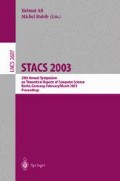Abstract
Harmonic is a randomized algorithm for the k-server problem that, at each step, given a request point r, chooses the server to be moved to r with probability inversely proportional to the distance to r. For general k, it is known that the competitive ratio of Harmonic is at least 1/2k(k + 1), while the best upper bound on this ratio is exponential in k. It has been conjectured that Harmonic is 1/2k(k + 1)-competitive for all k. This conjecture has been proven in a number of special cases, including k = 2 and for the so-called lazy adversary.
In this paper we provide further evidence for this conjecture, by proving that Harmonic is 6-competitive for k = 3. Our approach is based on the random walk techniques and their relationship to the electrical network theory. We propose a new potential function Φ and reduce the proof of the validity of Φ to several inequalities involving hitting costs. Then we show that these inequalities hold for k = 3.
Access this chapter
Tax calculation will be finalised at checkout
Purchases are for personal use only
Preview
Unable to display preview. Download preview PDF.
References
Y. Bartal, M. Chrobak, J. Noga, and P. Raghavan. More on random walks, electrical networks, and the harmonic k-server algorithm. Information Processing Letters, 84:271–276, 2002.
Y. Bartal and E. Grove. The harmonic k-server algorithm is competitive. Journal of the ACM, 47(1):1–15, 2000.
P. Berman, H. Karlo., and G. Tardos. A competitive algorithm for three servers. In Proc. 1st Symp. on Discrete Algorithms, pages 280–290, 1990.
A. Borodin and R. El-Yaniv. Online Computation and Competitive Analysis. Cambridge University Press, 1998.
A. K. Chandra, P. Raghavan, W. L. Ruzzo, R. Smolensky, and P. Tiwari. The electrical resistance of a graph captures its commute and cover times. Computational Complexity, 6:312–340, 1997.
M. Chrobak and L. L. Larmore. HARMONIC is three-competitive for two servers. Theoretical Computer Science, 98:339–346, 1992.
M. Chrobak and L. L. Larmore. Metrical task systems, the server problem, and the work function algorithm. In Online Algorithms: State of the Art, pages 74–94. Springer-Verlag, 1998.
M. Chrobak and J. Sgall. A simple analysis of the harmonic algorithm for two servers. Information Processing Letters, 75:75–77, 2000.
M. Chrobak and J. Sgall. Analysis of the harmonic algorithm for three servers. Technical Report ITI Series 2002-102, Charles University, Prague, 2002. http://iti.mff.cuni.cz/series/index.html
D. Coppersmith, P. G. Doyle, P. Raghavan, and M. Snir. Random walks on weighted graphs and applications to on-line algorithms. Journal of the ACM, 40:421–453, 1993.
P. G. Doyle and J. L. Snell. Random Walks and Electrical Networks. Mathematical Association of America, 1984.
E. Koutsoupias and C. Papadimitriou. On the k-server conjecture. Journal of the ACM, 42:971–983, 1995.
M. Manasse, L. A. McGeoch, and D. Sleator. Competitive algorithms for server problems. Journal of Algorithms, 11:208–230, 1990.
W. Percival. Solution of passive electrical networks by means of mathematical trees. J. Inst. Elect. Engrs., 100:143–150, 1953.
P. Raghavan and M. Snir. Memory versus randomization in on-line algorithms. IBM Journal on Research and Development, 38, 1994.
S. Seshu and M. B. Reed. Linear Graphs and Electrical Networks. Addison-Wesley, 1961.
Author information
Authors and Affiliations
Editor information
Editors and Affiliations
Rights and permissions
Copyright information
© 2003 Springer-Verlag Berlin Heidelberg
About this paper
Cite this paper
Chrobak, M., Sgall, J. (2003). Analysis of the Harmonic Algorithm for Three Servers. In: Alt, H., Habib, M. (eds) STACS 2003. STACS 2003. Lecture Notes in Computer Science, vol 2607. Springer, Berlin, Heidelberg. https://doi.org/10.1007/3-540-36494-3_23
Download citation
DOI: https://doi.org/10.1007/3-540-36494-3_23
Published:
Publisher Name: Springer, Berlin, Heidelberg
Print ISBN: 978-3-540-00623-7
Online ISBN: 978-3-540-36494-8
eBook Packages: Springer Book Archive

